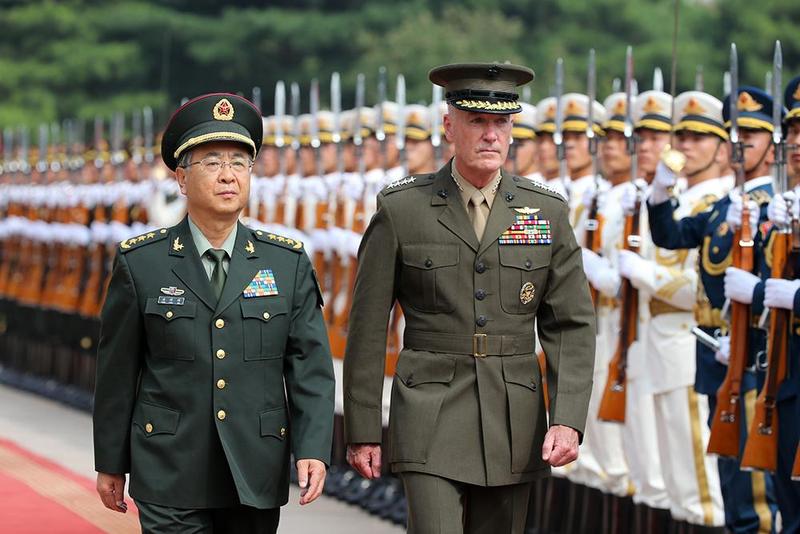Media Report

- The New York Post comments: "In a rare pressure campaign, the Chinese government is demanding Congress back off new laws that would strengthen the US relationship with Taiwan... In response to proposed legislation, the Chinese Embassy in Washington lodged a formal complaint with leading lawmakers, threatening 'severe consequences' for the US-China relationship if Congress follows through. China's tactics have angered lawmakers and staffers in both parties, who call them inappropriate and counterproductive. In an August letter from Chinese Ambassador Cui Tiankai that I obtained, the Chinese government expressed 'grave concern' about the Taiwan Travel Act, the Taiwan Security Act and Taiwan-related provisions in both the House and Senate versions of this year's National Defense Authorization Act. The measures represent 'provocations against China's sovereignty, national unity and security interests' and 'have crossed the 'red line' on the stability of the China-US relationship,' the letter stated... Lawmakers and aides told me the Chinese threat of 'severe consequences' was unusual and out of line."
- CNBC reports: "China is boasting of its growing economic and political development as the country comes to a standstill for the once-every-five-years Communist Party Congress. Over the weekend, China's ruling Communist Party said it has agreed to amend the party constitution amid expectations that it will be incorporating President Xi Jinping's political thought. The communique came after a secretive four-day assembly leading up to the Congress which starts this Wednesday in Beijing. Twelve senior party officials were reportedly expelled from the Communist Party during the meeting. Details of the document were extensively reported by the Chinese media, but there were no specifics about how exactly the constitution will be revised. The amendment, however, must include 'key theories and strategic thought,' reported top Communist Party-linked paper, People's Daily. It also affirmed Xi's crackdown on corruption and extolled loyalty to the party, 'follow its lead and stay in accordance with the [Communist Party of China's] Central Committee with Xi Jinping at the core, the newspaper added on Sunday. Last October, the Communist Party gave Xi the title of 'core' leader, a sign that his power was strengthening politically."
- The New York Times reports: "For decades, the Chinese Communist Party has pushed a stiff regimen of ideological education on students, requiring tedious lessons on Marx and Mao and canned lectures on the virtues of patriotism and loyalty. Now, amid fears that the party is losing its grip on young minds, President Xi Jinping is reshaping political education across China's more than 283,000 primary and secondary schools for a new era. Textbooks are getting a larger dose of Communist Party lore, including glorified tales about the party's fights against foreign invaders like Japan. Schools are adding courses on traditional medicine and Confucian thought to highlight China's achievements as a civilization. The government is scaling back discussion of iconoclastic writers like Lu Xun, amid concerns that exposing students to social criticism may inspire disobedience. In a stern directive issued last month, the party ordered schools to intensify efforts to promote 'Chinese traditional and socialist culture' — a mix of party loyalty and patriotic pride in China's past. Under this new formulation, the party is presented less as a vanguard of proletarian revolution and more as a force for reviving China and restoring it to its rightful place as a world power."
Calendar
- 2017-10-15 China's Pollution Crackdown Is Gaining Momentum
- 2017-10-13 China’s trade with North Korea slumps as nuclear sanctions finally start to bite
- 2017-10-12 Big twice-in-a-decade meeting in China may have a curious market impact
- 2017-10-11 China treats its foreign aid like a state secret. New research aims to reveal it.
- 2017-10-10 Chinese yuan strengthens in a sign of 'overriding stability' ahead of the key 19th Communist Party Congress
- 2017-10-09 1.34 million officials have been punished for graft since 2013, Chinese watchdog says
- 2017-10-06 U.S. defers China aluminum foil dumping decision
- 2017-10-05 High-level US-China Talks Focus on Immigration, Fugitives
- 2017-10-05 High-level US-China Talks Focus on Immigration, Fugitives
- 2017-10-04 Ivanka Trump's business in China shrouded in secrecy as public trade data disappears
News
- CNBC China stands at 'a new historic starting point,' Communist Party says
- The New York Times To Inspire Young Communists, China Turns to 'Red Army' Schools
- Bloomberg China Plots What's Next as Influence on Global Markets Grows
- CNBC China's producer price index crushes expectations
- Bloomberg China's Factory Inflation Rebounds Amid Capacity Cuts
- Financial Times China seeks dominance of global AI industry
- Fortune China's Central Banker Gives a Gravity-Defying 7% Growth Forecast Ahead of the Party Congress
- CNBC Here's where investors have reaped nearly 50% stock gains so far this year
- Financial Times Wanda golf courses closed in China austerity push
- MarketWatch Oil headed to $10? China may be in the driver's seat
- Bloomberg A Beautiful Opportunity in China
- BBC News China congress: How authorities censor your thoughts
- Los Angeles Times How China's Xi Jinping went from administrator to authoritarian
Commentary
- The New York Post China puts rare pressure on US over Taiwan relationship
- Forbes China Could Take Bitcoin Prices Below $5,000 This Week, Again
- Politico 'China Is Laughing About This Situation'
- The New Yorker Xu Tan Re-Creates "Made in China" for the Guggenheim
- Forbes China's Economy Performs Suspiciously Well Ahead Of Landmark Political Event
- Quartz Your simple guide to the Chinese Communist Party's 19th congress
- The Wall Street Journal China's Greatest Challenge